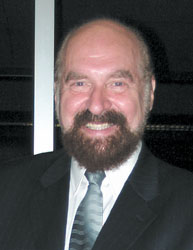Chris Tozlian
Staff Writer

It is rare to sit and converse with a complete stranger who so thoroughly intrigues you; yet I had this opportunity when, across the table sat Dr. Robert Hewsen, Henry S. Khanzadian Kazan Visiting Professor for the Armenian Studies Program. Though our conversation was relatively brief, I left the room realizing that Dr. Hewsen was not only a historian, but also a true scholar.
When Dr. Hewsen received his Ph.D. from Georgetown University, it was at a time when there were no Armenian Studies courses offered, let alone an Armenian Studies program, on any campus. However, since his graduation, Dr. Hewsen has had a passion for Armenian Studies; it is precisely for this reason that he received his Ph.D. in Russian and Byzantine history, since many historians at that time considered Armenian history to be a sub-section of either Russian or Byzantine history. Dr. Hewsen has spent the last 33 years teaching both Byzantine and Russian history at Rowan University of New Jersey.
Dr. Hewsen confessed that he still enjoys teaching Armenian history courses, especially to students who share his enthusiasm for that subject. He said that the interest demonstrated by those currently enrolled in his “Armenians in the 20th Century” course and “The Conversion of Armenia to Christianity” course made teaching these courses remarkably enjoyable.
Because Dr. Hewsen is originally from New York, I thought life in Fresno might be a drastic change, for he and his wife Mary-Ellen, from life in the largest city in the nation. Yet when asked how he likes Fresno, Dr. Hewsen replied, “I really like it. It’s a really nice town and the community has been very welcoming to us.” Then, when asked about how Fresno State students compare with students at other universities where he has taught, Dr. Hewsen replied, “I have some very enthusiastic students who make the time fly,” and then commended his students for their desire to learn the subject matter. Dr. Hewsen says he enjoys teaching at Fresno State because the classes he’s offering are specialty courses and, as a result, only those interested in the subject are taking the classes.
Dr. Hewsen has carefully studied Armenia’s conversion to Christianity. When asked to explain the global and historical importance of the conversion of Armenia to Christianity early in the fourth century AD, he succinctly answered that the Armenian conversion to Christianity was important “because the question of who was going to control Armenia during this time was always complicated by the fact that the Armenians were Christians and that all those around them were not. That is, of course, what has been causing the problems in Armenia down to the present day.”
This semester, Dr. Hewsen, as part of his duties as the Kazan Visiting Professor, will be giving a series of three lectures dealing with the topic of “Conversion of Armenia to Christianity.” In his own words, “The three lectures will be a distillation of the course,” which will survey pre-Christian Armenia, King Trdat & the conversion to Christianity, and Armenia in the century after its conversion to Christianity.
This lecture series is promising for three reasons. First, Dr. Hewsen is a captivating historian who will speak in a way that will intrigue all who attend. Second, Dr. Hewsen’s course on the “Conversion of Armenia to Christianity” is the only course being offered on the conversion of Armenia to Christianity anywhere in the United States this semester, which gives those who attend the lectures a taste of this unique course. And lastly, the subject matter covered by Dr. Hewsen is not only complex, but is difficult to interpret due to biased sources and common misconceptions; both of these problems will be discussed and treated by Dr. Hewsen during the lectures.
Dr. Hewsen’s plans for the near future involve publishing two books that deal with Armenian history; one that focuses on the conversion of Armenia to Christianity, the other focusing on the Armenian national movement of the 18th century. He will continue teaching at Fresno State through the end of the Spring 2002 semester, offering courses on the history of Karabagh and modern Armenian history.
When our conversation ended, not only did I realize how lucky I had been to meet such an interesting individual, but I also came to a fuller realization of the quality of professors that the Armenian Studies program has had, does have, and will continue to have.
Dr. Hewsen’s lectures on October 4th, November 1st, and December 6th will offer the community an opportunity to hear this remarkably knowledgeable professor.
 Hye Sharzhoom Armenian Action
Hye Sharzhoom Armenian Action